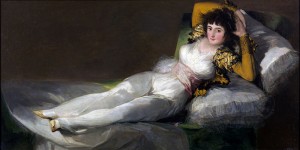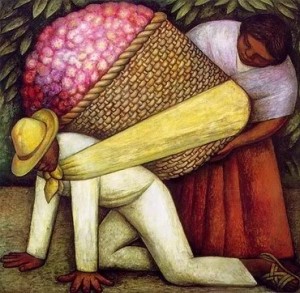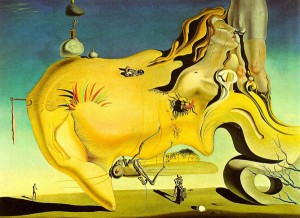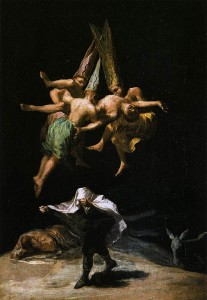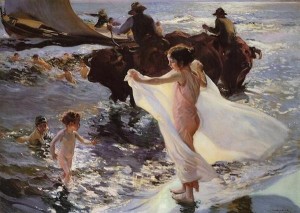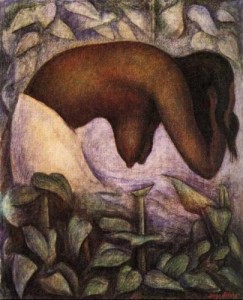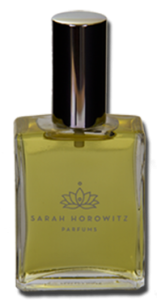Goya Maja
The mild climate of the Northwestern Pacific coast is a true blessing for me. During the times I spent Summers in the Midwest or the Southeast I had taken three showers a day and still every once in a while heat had made my mind dizzy and I ran straight to the cold shower to regain the ability to sit up and think straight. I did not consider wearing perfume in the Summers then, and August was a particular nightmare. And before coming to the United States, August was my least favorite month (on which I plan to tell you a bit more later, in the end of the month). So, I was more than intrigued by the concept of Lioness – a perfume by Sarah HorowitzThran of Sarah Horowitz Parfums that was inspired by both the month of August and the astrological sign of Leo. I was prepared for anything, good or bad, because you see, in addition of only starting to build a strong positive connection with August, I’ve had my share of bad luck with Leo women. But I am ready to start building a strong positive connection with leonine women as well, so forward I went.
Luxurious oil of Lioness on my arm was modulating between a fresh gorgeous blood orange note and a smell that invoked a glass of Margarita with a salty rim and a trace of lipstick. As I was waving my arm to and from my nose, the scenes created by the smell changed each other with a click. There – a cut open blood orange, here – a Margarita glass, back to the blood orange again… I need to notice that I got more blood orange from the warmer points of my skin, it was most gorgeous in the crease of my elbow, so I can imagine that this perfume oil will work great in the heat.
Flower Carrier Diego Rivera
My thinking about this fragrance modulated between these two as well, but it finally settled on one. If I kept thinking about the cocktail glass, I would have written a different review. But my mind settled on blood orange, a lot of oranges, bright blue sky of Spain, and I started reciting a poem I haven’t thought for many years.
Orange and lemon.
Oh, the girl
unhappy un love!
Lemon and orange.
Alas for the girl,
the pale girl!
Lemon.
(How the sun was glinting.)
Orange.
(Off the pebbles
in the water).
(Federico Garcia Lorca, trans. Alan S. Trueblood)
And once I started thinking about Lorca, there was no coming back. I fell into the vortex of the time machine and got transported into a hot Summer night on which I picked up a collection of Lorca’s poetry translated into Russian. I started by opening the first page and looking at the preface. Normally, I wouldn’t be reading the poetry collection starting from page one, and especially from the preface, but the night was mine, I had a lot of time on my hands and having all that free time was bittersweet. I may have forgotten to read any other preface to any other poetry book I’ve picked up, and I am OK with that, but this preface was meant to be read because it turned out to be so much more than a preface. The author was explaining the connection to Lorca’s poetry to traditional Andalusian song called cante jondo, and for the first time I felt a hard knock on my heart from two yet-unfamiliar words: cante jondo. Cante jondo literally means deep singing. The example of a traditional cante jondo song from Andalusia provided in the preface gave my heart another hard knock: “take my heart, burn it on the candle, but do not touch the ashes – they will burn you too.” For the first time in my life I regretted that I was not the first to utter those words, cry them out, bleed them into a love letter and send them flying and dissipating into warm August air.
Salvatore Dali- The Great masturbator
Raw emotionality, love and death, deceptively simple very close to home metaphors and putting one’s life into a song – that is what defines cante jondo. Lorca had embraced it both in his own poetry (one of his collections of poems was called Poema del Cante Jondo) and in his work to preserve the traditional songs and to give them a renewed meaning. This is what he said about cante jondo at a conference devoted to it in 1931:
“The "cante jondo" approaches the rhythm of the birds and the natural music of the black poplar and the waves; it is simple in oldness and style. It is also a rare example of primitive song, the oldest of all Europe, where the ruins of history, the lyrical fragment eaten by the sand, appear live like the first morning of its life.”
And this is how he did it ten years earlier, in 1921 in his poem Guitar from Poema del Cante Jondo collection:
Goya Witches
The weeping of the guitar begins
Useless
to silence it.
Impossible
to silence it.
It weeps monotonously
as water weeps
as the wind weeps
over snowfields.
Impossible
to silence it.
It weeps for distant
things.
Hot southern sands
yearning for white camellias.
Weeps arrow without target
evening without morning
and the first dead bird
on the branch.
Oh, guitar!
Heart mortally wounded
by five swords.
(from Guitar by Federico Garcia Lorca, trans. Cola Franzen)
That Summer night of reading Lorca is long gone, and now the August nights in my Pacific Northwestern home are chilly. I have not thought about cante jondo in years. But it came to my mind to help me understand the Lioness and with that connect it to Sarah Horowitz Thran 's Perfume of the same name.
La Hora Del Bano (The Bathing Hour) – Joaquin Sorolla y Bastida
So I saw it! Lioness, she is a woman with leonine passion, coming from the sea, throwing her head back and singing cante jondo. She is tall and proud, she wears a smile and a look of attitude, but there is a presence of something darker in her posture, in her singing, in the ringing notes in her voice. She carries a secret that she will not tell: yes, hot and passionate, she is not as happy as she can be. What darkness mires her beach joys? Is it an unrequited love? Or does it come somewhere from within?..
Diego Rivera The Bather
As the woman sings, the world transforms around her and the smell on my arms gets stronger, spicier (I always perceive carnation as peppery spicy than floral), muskier, and finally dries into a thick dark ambery base (and again, I need to mention that contrary to my usual experience, the fragrance developed slower on warmer skin, and I had the slowest development in my elbow. What a joy to be able to use oil on these parts of the skin! What a joy must this be to enjoy a perfume development on a hot evening!).
This base is as dark as a last farewell. It is not sweetened by any illusions but is strengthened by the knowledge that life goes on even when everything is over. It is strengthened by the sheer life force itself, stronger than anything.
If I die,
leave the balcony open.
The little boy is eating oranges
(From my balcony I can see him).
The reaper is harvesting the wheat
(From my balcony I can hear him).
If I die
Leave the balcony open!
(Federico Garcia Lorca, trans. Alan S. Trueblood)
Federico Garcia Lorca was arrested on August 18, 1936 by the fascists militia in Granada and executed on August 19, 1936.
Disclosure: This review was based on a sample of perfume oil provided by Sarah Horowitz perfumes.
The English translations of selected poems by Lorca came from the bilingual edition edited by Christopher Mauer – I received this book from my friends Nina Khashchina and Igor Nazarenko who were taking care of lovesick me in New York in March 2000.
–Olga Rowe, Monthly Contributor
Courtesy of Sarah Horowitz Thran of Sarah Horowitz Parfums the new Lioness, the fragrance of August.Lioness is a banque de parfum that is created monthly for Sarah's customers. They are limited editions. For our draw, Sarah has offered a one ounce edp for one CaFleurebon reader. To be eligible, leave a comment about the connection between Lorca and Lioness from Olga's post that resonated with you or the name of your favorite woman born under the sign of Leo or your favorite Sara Horowitz perfume. Draw ends August 28, 2012
We announce the winners only on site and on our Facebook page, so Like Cafleurebon and use our RSS option…or your dream prize will be just spilled perfume

